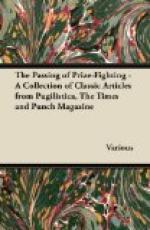Tuesday, July 3rd.—The House of Lords was crowded to hear Lord HARDINGE’S comments upon the Mesopotamia Report. Even those critics in the Commons who had declared that a civil servant should not take advantage of his position as a peer to make a personal explanation would, I think, have had no reason to complain of its character. His object was not to defend himself, but to call attention to the splendid services that India had rendered to the Empire during the War in other fields than Mesopotamia. In his own phrase, “India was bled absolutely white during the first few weeks of the War.”
When the report comes up for formal discussion Lord CURZON will doubtless have something to say, and will say it in vigorous fashion. To-day, with the air and mien of a highly respectable undertaker, he contented himself with acknowledging Lord HARDINGE’S contribution and deprecated further debate.
Lord ROBERT CECIL, safely back from his travels, does not appear to have kept himself up to date in the interval, for he was ignorant of the refusal of the Allies to allow Greece to set up a republic, although Mr. KING, with his superior sources of information, knows all about it.
[Illustration: PARENTAL PRIDE. LORD DERBY.]
At the close of Questions a stalwart young man in khaki advanced to the Table, and, amid the cheers of the Members and to the obvious delight of Lord DERBY, who sat beaming with parental pride in the Peers’ Gallery, added the signature “STANLEY” to a roll which has rarely been without that name since “the Rupert of debate” signed it there close on a hundred years ago.
Excess profits provided the theme for some lively speeches to-day. Major HAMILTON did not see why farmers should escape the tax, and instanced the case of a potato-grower who had made ten thousand pounds out of a couple of hundred acres. Several Members connected with the shipping interest protested against the tax. Mr. LEIF-JONES implied that it was more disastrous than the U-boats, and Mr. HOUSTON loudly protested at being represented as a harpy.
By these complaints Mr. BONAR LAW was absolutely unmoved, and for very good reason. He had himself a few thousands invested in shipping, and, as he was getting about fifty per cent., instead of the modest five per cent. which he had anticipated, he had come to the conclusion that even under present conditions the trade was doing pretty well. After this confession of an involuntary profiteer the tax was agreed to. But the farmers, with next year’s Budget in view, are praying that the conscientious CHANCELLOR will not invest his surplus profits in land.
Wednesday, July 4th.—We all know the ex-poacher-turned-game-keeper. The converse process has taken place in the case of Lord PORTSMOUTH, who, when he ceased to be a Minister of the Crown, became a bitter critic of successive Administrations. His complaints of our blockade policy were frigidly acknowledged by Lord MILNER and hotly resented by Lord LANSDOWNE, upon whom Lord PORTSMOUTH’S ruddy beard always has a provocative effect. It is all very well to talk of being ruthless to neutrals, but if we had adopted the noble lord’s policy early in the War would the Union Jack and the Stars and Stripes be to-day floating side by side all over London?




